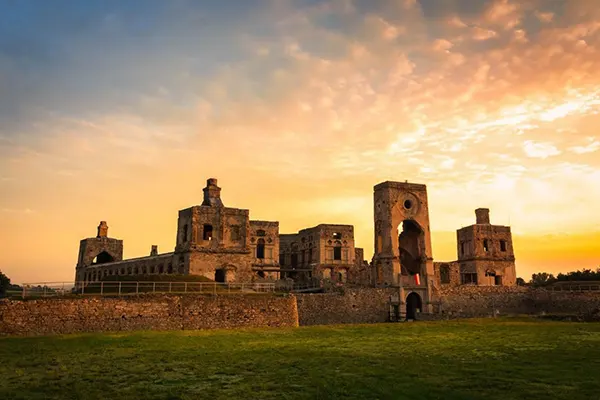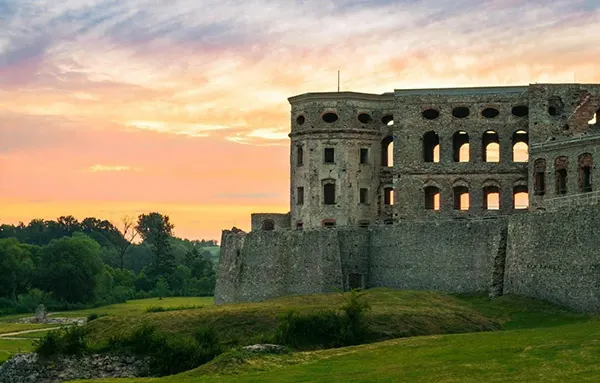
Opatów – A Thousand Years of History in a Small Polish Town
Opatów is one of the oldest towns in Poland, with roots dating back to the 10th century. This small yet historically rich settlement has played a remarkable role in the country’s religious, architectural, and cultural development. Its unique charm lies in the harmonious blend of medieval structures, Romanesque landmarks, and deeply rooted local traditions that have survived the centuries.
Historical Landmarks and Architecture
One of the most recognisable symbols of Opatów is the Collegiate Church of St Martin, an architectural treasure from the Romanesque period. Built in the 12th century, it features an impressive façade and a well-preserved interior that showcases both Romanesque and Gothic elements. The church is not only a place of worship but also a monument that tells the story of medieval Poland’s spiritual and artistic life.
Another point of historical interest is the town’s medieval underground route, stretching beneath the central part of Opatów. Originally used as a storage space and a refuge during invasions, the route has been transformed into a museum that attracts numerous tourists each year. Walking through its narrow tunnels gives a rare insight into the living conditions and urban planning of the Middle Ages.
Above ground, Opatów’s ancient city walls and remnants of defensive towers illustrate the town’s strategic importance in medieval times. Although much of the original fortification has not survived, fragments of walls and the Gothic-style Warsaw Gate still stand proudly, reminding visitors of the town’s former glory.
Religious and Cultural Significance
Throughout the centuries, Opatów served as an important religious centre, particularly due to its location at the intersection of major trade and pilgrimage routes. The Collegiate Church was a hub for clerical activities and hosted various religious orders. These influences shaped the town’s spiritual identity and laid the foundation for its ecclesiastical architecture.
In addition to Christianity, Opatów was home to a vibrant Jewish community before the Second World War. Synagogues and schools once flourished here, making it a culturally diverse and intellectually active place. While most of this legacy was destroyed during the Holocaust, a restored synagogue building now houses a small museum commemorating the Jewish heritage of the region.
Annual religious and folk festivals continue to preserve Opatów’s traditional customs. Events such as Corpus Christi processions and harvest celebrations bring the local community together and offer a glimpse into the deeply rooted values that have defined the town for centuries.
Opatów’s Sweet Specialities
One of the town’s most beloved traditions is its unique confectionery. Opatów is famous for its hand-made “Opatowskie pączki,” a traditional Polish doughnut filled with rose jam or plum preserve. These treats are especially popular during Carnival season and can be found in nearly every bakery across the town.
Equally cherished are the town’s signature “krówki,” soft milk caramels with a creamy texture. These sweets are often wrapped in paper bearing the town’s emblem and are considered a culinary souvenir for tourists. Their recipe has been passed down through generations, preserving not just the flavour but a sense of local identity.
Local pastry shops also offer seasonal delights and artisan cakes made using age-old techniques. Many of these family-run businesses have operated for decades, continuing to honour the town’s reputation for authentic Polish confectionery. The pride in these culinary customs is evident in the quality and care with which each item is made.
Tourism and Local Hospitality
Today, Opatów has embraced its historical heritage as a driver of tourism and community development. The town has invested in preserving its landmarks, developing guided tours, and expanding hospitality services for visitors. Walking tours, historical reenactments, and cultural workshops are available year-round.
Small guesthouses, local inns, and family-run restaurants cater to tourists seeking a more intimate experience. These establishments often integrate historical decor and locally sourced produce into their offerings, ensuring guests not only explore history but also taste and feel it during their stay.
Visitors are also encouraged to participate in regional events like handicraft fairs and wine tastings, which showcase the region’s rural charm and artisanal talent. Opatów’s friendly and proud residents play a key role in making the town welcoming and memorable for travellers from across Poland and beyond.

Preservation and Modern Challenges
While Opatów continues to attract history enthusiasts and cultural tourists, the town faces modern challenges, including depopulation and limited economic development. Younger generations often move to larger cities, leaving behind an ageing population and a reduced workforce for local enterprises.
However, local authorities and non-profit organisations are actively engaged in heritage preservation and rural revitalisation. Projects aimed at restoring monuments, modernising infrastructure, and promoting sustainable tourism have been implemented with the support of EU cultural heritage funds.
Efforts to digitise Opatów’s archives and create virtual museum tours are also underway, helping to make the town’s history accessible to a global audience. By balancing preservation with innovation, Opatów aspires to remain not just a relic of the past but a living centre of culture and tradition in 21st-century Poland.
The Role of Community in Shaping the Future
At the heart of Opatów’s resilience is its local community. Residents actively participate in municipal decisions, volunteering for cultural initiatives and engaging in educational programmes about the town’s heritage. These efforts strengthen social ties and promote civic pride.
Schools and youth centres in Opatów incorporate history education into their curricula, encouraging young people to learn about and appreciate their town’s legacy. Student-led history clubs and local contests further reinforce this connection between past and future.
Collaborations between local government, business owners, and cultural institutions show that preserving Opatów’s identity is a shared responsibility. As new generations step forward, the community remains dedicated to ensuring that the town’s thousand-year story continues to be told with accuracy, dignity, and care.




